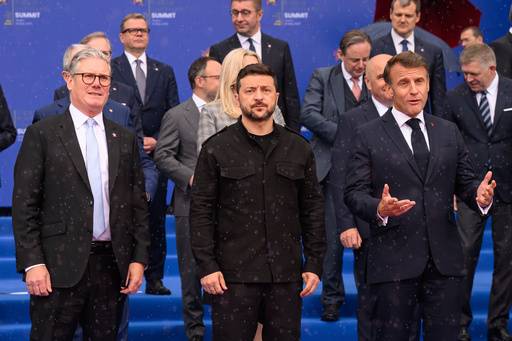EU, Britain eye new Russia sanctions

BRUSSELS/LONDON/WASHINGTON—The European Union and Britain announced new sanctions against Russia on Tuesday without waiting for Washington to join them, a day after President Donald Trump’s phone call with Vladimir Putin brought about neither a ceasefire in Ukraine nor fresh US sanctions.
London and Brussels said their new measures would zero in on Moscow’s “shadow fleet” of oil tankers and financial firms that have helped it avoid the impact of other sanctions imposed over the war.
“Sanctions matter, and I am grateful to everyone who makes them more tangible for the perpetrators of the war,” Ukraine’s President Volodymyr Zelenskyy wrote on Telegram.
High expectations from US
He said it “would be good” if the United States added its help, adding: “It is important that America remain involved in the process of bringing peace closer.”
The sanctions were unveiled without an immediate announcement of corresponding steps from Washington, despite intense public lobbying from European leaders for the Trump administration to join them if Russia rejected a ceasefire.
“We have repeatedly made it clear that we expect one thing from Russia—an immediate ceasefire without preconditions,” German foreign minister Johann Wadephul said on the sidelines of a meeting with EU counterparts in Brussels.
Time for sanctions
As Russia had not accepted a ceasefire, “we will have to react,” he said. “We also expect our US allies not to tolerate this.”
Trump told reporters on Tuesday he was deliberating over what actions to take, but gave no further details.
“We’re looking at a lot of things, but we’ll see,” he said.
In a two-hour conversation with Putin on Monday, the US president dropped his earlier insistence on an unconditional 30-day ceasefire and signaled that the war he once promised to end in 24 hours was no longer his to fix—a message that leaves Ukraine vulnerable and its allies worried.
Asked on Monday why he had not imposed fresh sanctions to push Moscow into a peace deal, Trump said that could make the situation worse and affect the chance of a deal, while adding: “But there could be a time where that’s going to happen.”
Trump said after talking to Putin he had told Zelenskyy and European leaders that Russia and Ukraine would immediately start negotiations on conditions for a ceasefire, a process Russia said would take time.
Pope to host talks
Russia and Ukraine held their first direct talks in more than three years on Friday at Trump’s behest, but failed to agree on a truce after Moscow presented conditions that a member of the Ukrainian delegation called “nonstarters.”
Italian Prime Minister Giorgia Meloni said on Tuesday that Pope Leo had confirmed to her his willingness to host in the Vatican the next round of negotiations to try to end the war.
US Secretary of State Marco Rubio told a congressional hearing on Tuesday that Putin had not received any real concessions in the US effort to initiate talks and existing US sanctions on Russia remained in place.
“The president … believes that right now, you start threatening sanctions, the Russians will stop talking, and there’s value in us being able to talk and drive them to get to the table. We’ll see,” Rubio said.
Ukraine says it is ready for an immediate ceasefire. The Europeans say Russia’s insistence on talks first is proof that Putin, who started the war by invading his neighbor in 2022, is not prepared to end it.
European Commission president Ursula von der Leyen said a further package of sanctions was being prepared.
“It’s time to intensify the pressure on Russia to bring about the ceasefire,” she said.
Reuters, the news and media division of Thomson Reuters, is the world’s largest multimedia news provider, reaching billions of people worldwide every day. Reuters provides business, financial, national and international news to professionals via desktop terminals, the world's media organizations, industry events and directly to consumers.

















